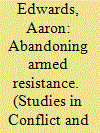|
|
|
Sort Order |
|
|
|
Items / Page
|
|
|
|
|
|
|
| Srl | Item |
| 1 |
ID:
087392


|
|
|
|
|
| Publication |
2009.
|
| Summary/Abstract |
This article explores the Ulster Volunteer Force's (UVF) decision in May 2007 to abandon its campaign of "armed resistance" and pursue "a non-military, civilianized, role" in Northern Ireland. It does so by analyzing the UVF's actions in light of the academic literature on strategic terrorism. The central argument advanced in the article is that the UVF's decision to put its weapons "beyond reach" and re-structure its organization along civilian lines is (a) internally consistent with its stated policy of countering "violent nationalism," (b) symptomatic of the transformation in the sociopolitical context since the 1994 paramilitary cease-fires, and (c) the logical outworking of the group's lack of popular legitimacy among its core Protestant working-class support-base. The article concludes with an assessment of the risks and possible dividends that the end of UVF terrorism holds for the Northern Ireland peace process.
|
|
|
|
|
|
|
|
|
|
|
|
|
|
|
|
| 2 |
ID:
087391


|
|
|
|
|
| Publication |
2009.
|
| Summary/Abstract |
The collapse of the informal alliance between the Federal Government and ethnic minorities of the Niger Delta brought significant changes in their modes of power relations. The alliance had developed as a form of buffer against Igbo hegemony and domination over these minorities. The passing of a vote of no confidence on the alliance by the minorities was largely connected, then, as now, to oil and environmental politics and attendant distributive politics that place the minorities at the mercy of the government. These underscore the resort to dissent and excesses by the Niger Delta and the state, respectively. This article explores the rise and fall of the alliance and attendant intrigues. It illustrates the character of dissent and state excesses as well as their accomplishments and failures. It concludes that the resort to dissent by the minorities and excesses by the state has had mixed outcomes, making it difficult for both parties to fully actualize their goals. Finally, the article suggests the need to address the roots of observable contradictions, which lie in the asymmetrical system of power relations engendered by oil, environmental, and distributive politics. This calls for devising an acceptable and equitable method of power sharing and revenue allocation predicated on fairness, equity, and social justice.
|
|
|
|
|
|
|
|
|
|
|
|
|
|
|
|
| 3 |
ID:
087388


|
|
|
|
|
| Publication |
2009.
|
| Summary/Abstract |
The defeat of Al Qaeda in Iraq may generate new threats associated with the dispersal of its fighters in the region and around the world. Veterans of earlier insurgencies and civil wars in Afghanistan, Bosnia, and Chechnya moved from one conflict zone to another, lending combatants valuable skills and networks of support. The flight of Iraq's irreconcilable insurgents is a greater threat to global security than the one posed by the Arab Afghans because of the range of combat experiences and skills acquired in Iraq since 2003. This manuscript revisits the history of Arab veterans of the anti-Soviet struggle in Afghanistan (1979-1989) to draw out lessons for countering the current bleed out from Iraq. It explores the diverse pathways taken by these "Arab Afghans" and the factors that facilitated different patterns of dispersal around the globe. The article concludes with broad strategic recommendations for counterterrorism measures.
|
|
|
|
|
|
|
|
|
|
|
|
|
|
|
|
| 4 |
ID:
087389


|
|
|
|
|
| Publication |
2009.
|
| Summary/Abstract |
The insurrection in Pakistan's tribal areas has been unexpectedly robust, lethal, and resilient, which has surprised many in Pakistan and the Western world. The focus of the violence emanating from this region is not confined to Afghanistan or Pakistan alone, but spans the entire world, especially Europe and North America. A number of external actors like Al Qaeda and its associates are exploiting the prevailing lawlessness in Federally Administered Tribal Areas (FATA) for sanctuary and a base for their logistical, training, and operational purposes, while the local Taliban reap rich financial rewards in the mayhem.
|
|
|
|
|
|
|
|
|
|
|
|
|
|
|
|
| 5 |
ID:
087390


|
|
|
|
|
| Publication |
2009.
|
| Summary/Abstract |
Propaganda is at the heart of the struggle between Al Qaeda's strain of militant Islamism and the governments of the United States and United Kingdom. In an ideological struggle, propaganda is critical in shaping outcomes. Both Al Qaeda and the U.S. and U.K. governments recognize this, and have devised propaganda strategies to construct and disseminate messages for key audiences. This article considers the key elements in the Al Qaeda propaganda narrative, and the means through which it is disseminated. On the other side, it assesses the U.S. and U.K. governments' response, focusing particularly on the British effort to define and propagate a narrative centered on British values.
|
|
|
|
|
|
|
|
|
|
|
|
|
|
|
|
|
|
|
|
|